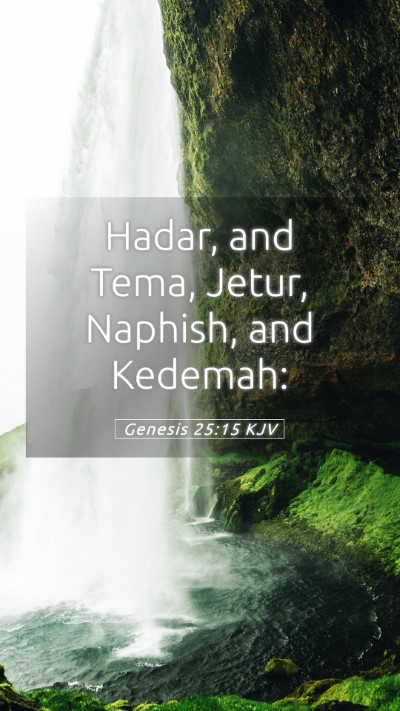Bible Verse Meaning and Commentary on Genesis 25:15
Verse: “And Adbeel, and Mibsam, and Mishma.” - Genesis 25:15
This short but significant verse mentions the names of some of the sons of Ishmael. The genealogies found in the Bible often serve as historical records and are crucial for understanding the development of nations and tribes.
Insights from Public Domain Commentaries
Matthew Henry’s Commentary
Matthew Henry elaborates on the significance of names in the Bible and their prophetic implications. The author notes that the descendants of Ishmael represent various nations that would arise. Each name listed may indicate traits or future destinies of these nations. Their mention serves to fulfill the promise made to Abraham regarding Ishmael’s descendants becoming a great nation.
Albert Barnes’ Commentary
Albert Barnes focuses on the notion that Ishmael’s sons are not merely names but distinct personalities who contributed to the social and political landscape of their time. He emphasizes that these names might reflect broader themes of struggle and development within families and nations, highlighting how the characters of individuals can resonate through generations.
Adam Clarke’s Commentary
Adam Clarke discusses the historical context of Ishmael and his descendants. He posits that these names represent the various tribes that descended from Ishmael, which are documented as occupying areas near Egypt. Clarke emphasizes that understanding these names helps readers gain insight into the historical divisions within the Arab nations and their origins, essential for an informed reading of Biblical history.
Summary of Themes
- Importance of Genealogy: This verse provides a foundation for understanding the relationships and developments in the regions surrounding Israel.
- Cultural and Historical Context: The attention to Ishmael’s lineage brings forth issues of promise, inheritance, and the tensions that evolve as various peoples trace their roots through Biblical narratives.
- Religious Significance: The prominence of Ishmael and his descendants serves as a reminder of God’s covenant and the implications it has on nations formed from Abraham’s offspring.
Practical Applications in Bible Study
Those engaging in bible study insights can utilize this passage to connect with broader themes of identity and purpose within Scripture. It prompts readers to consider:
- How does understanding genealogy enhance our Bible study plans?
- What light does this verse shed on the interplay between God’s promises and human history?
- How can the struggles and legacies of Biblical figures like Ishmael inform our modern understanding of family and cultural heritage?
Related Scripture Cross References
- Genesis 16:11-12: Discusses God's promise concerning Ishmael's future and character.
- Genesis 17:20: Indicates God’s covenant with Ishmael and the multitude of his descendants.
- Islamic texts: While not in the Bible, exploring Islamic references to Ishmael can provide insight into his significance across cultures.
Conclusion
This brief verse encapsulates much of the broader narrative present in the Book of Genesis. The significance of genealogies in understanding the relationships among people and nations cannot be understated. For those engaged in Bible verse commentary or seeking a deeper understanding of Scripture, Genesis 25:15 serves as a foundational text offering insights into God’s plans for His people throughout history.
In engaging with this verse and its context, readers can appreciate the richness of the Biblical narrative and its ongoing relevance in the study of faith, genealogy, and God's promises.


